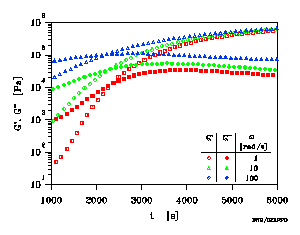|
Architects of Rheo-Hub
Dr. Marian Mours
Mours is currently working for a major German chemical company. He received his Ph.D. with H. Henning Winter at UMass Amherst in 1997. He also holds a diploma in chemical engineering from the University of Karlsruhe, Germany. In his Ph.D. work, he studied the rheological behavior of nearly critical gels. During his time in Amherst, he was involved in developing the Time Resolved Mechanical Spectroscopy (TRMS) approach for studying materials with changing properties. After having returned to Germany, Mours converted the IRIS code from DOS to
visual C++ and added many new features and capabilities.
Professor H. Henning Winter
Winter's long-standing interest
in experimental rheology began about 30 years ago when he could not find suitable
rheological material data for his numerical calculations. Soon it became obvious
that obtaining rheological data was not the main problem; converting these data
into useful rheological material functions such as time spectra, viscosity, and
modulus was the most difficult step. Little help was available here. A
breakthrough came with Baumgaertel’s 1987 discovery of a robust method of
converting dynamic mechanical data from the frequency to the time domain. This
suddenly allowed an efficient data analysis and gave increased insight into the
underlying phenomena. Since then, after much collaborative work, the data
analysis methods have become user-friendly and comprehensive while giving
answers within minutes. The new methods have found widespread application. The
original code was developed in collaboration with M. Baumgaertel and P. Soskey. M. Mours converted the original DOS code to visual C++ and introduced many
methods from the literature. Recently, in collaboration with international experts, we extended the IRIS code and began to
access molecular theory, non-linear viscoelasticity theory, and molecular simulation.
Winter (https://en.wikipedia.org/wiki/Horst_Henning_Winter) has been
educated mostly in Stuttgart, Germany, but he also studied in Berlin (Germany),
Stanford (California), and Madison (Wisconsin). He is faculty at the University
of Massachusetts Amherst since 1979. He received the Bingham Medal of the
Society of Rheology, the v. Humboldt Price, and a Creativity Award of NSF.
Winter is editor of Rheologica Acta
from 1989 to 2016. Winter and his group have been studying the rheology of polymers
near transition states (phase separation, ordering transitions, connectivity
transitions, crystallization, electric field induced gelation) with a wide
range of experimental methods. Besides experimental rheology, Winter's group also develops novel polymeric materials through processing.
PUBLICATIONS
Publications of Winter and Coworkers.
|
